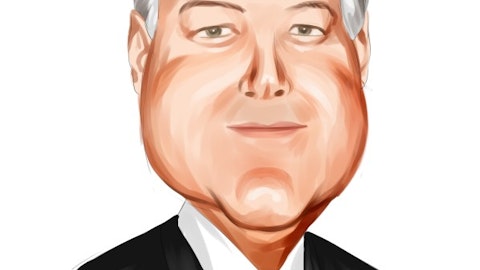Below we present the list of 5 Stocks That Will Own the Metaverse. For our methodology and a more comprehensive list please see 10 Stocks That Will Own the Metaverse.
5. NVIDIA Corporation (NASDAQ:NVDA)
Number of Hedge Fund Shareholders: 84
The second half of the list kicks off with another prominent chipmaker, NVIDIA Corporation (NASDAQ:NVDA), the world’s leading GPU maker. Nvidia is partnering with Pixar, Adobe, Siemens, and other companies to expand Pixar’s Universal Scene Description (USD) into a 3D platform that can support industrial metaverse applications related to architecture, engineering, robotics, and manufacturing.
Nvidia’s Omniverse platform, which is based on USD, allows developers to simulate large scale worlds that can be used to test ideas, train AI, and perform virtual testing through the use of digital twins. Ericsson is one of many leading companies that use the Omniverse platform, in its case to optimize the deployment of 5G, another field that Qualcomm is a major player in.
Hedge fund ownership of NVIDIA Corporation (NASDAQ:NVDA) is down by 24% over the past two quarters after soaring in the fourth quarter of 2021. It remains relatively in line with smart money ownership of the stock over the past three years. Ken Fisher’s Fisher Asset Management owns a $1.15 billion stake in Nvidia as of June 30, holding 7.59 million shares of the company in its 13F portfolio.
The Baron Fifth Avenue Growth Fund shared some of the investor concerns around NVIDIA Corporation (NASDAQ:NVDA), as well as outlining the company’s ongoing strengths in its Q2 2022 investor letter:
“At the company-specific level, there was a broad correction across the entire portfolio. While four of our holdings contributed to performance, the contribution to absolute returns was less than 100bps combined, as unfortunately none of them were large enough to move the needle. We had 16 investments detracting over 100bps each with NVIDIA (NASDAQ:NVDA), our second largest detractor, costing the Fund 254bps.
NVIDIA’s stock was hit even harder, down 44.4%, impacted by concerns over the health of the consumer, dramatic declines in crypto, and COVID-related lockdowns in China. Despite the sell-off and the increased near-term volatility in its gaming business, NVIDIA’s revenues grew 46% year-over-year with 48% operating margins, driven by continued strength in its data center business as companies across industries adopt AI and ML…” (Click here to see the full text)
4. Advanced Micro Devices, Inc. (NASDAQ:AMD)
Number of Hedge Fund Shareholders: 88
Advanced Micro Devices, Inc. (NASDAQ:AMD)’s Radeon GPUs account for about 13.7% of all GPU sales, with particularly strong representation in laptops. The company is also making inroads in the discrete graphics market, slowly eating into Nvidia’s dominant position in that space.
Meta Platforms is also collaborating with AMD in its efforts to build out the metaverse, though not in the way one might envision. Instead, the social media giant will use AMD’s Xilinx Zynq UltraScale RFSoC radio chip to build cheaper Evenstar radio units, which Meta Platforms is looking to deploy aggressively to expand broadband coverage around the world and connect more people to the metaverse.
Unlike most other chipmakers, which hedge funds have shied away from in recent quarters, ownership of Advanced Micro Devices, Inc. (NASDAQ:AMD) has jumped by 26% over the past two quarters to hit an all-time high. Karl Richter’s Sora Investors and Josh Resnick’s Jericho Capital Asset Management were among the many funds to initiate positions in AMD during Q2.
The Baron Opportunity Fund likes the steps Advanced Micro Devices, Inc. (NASDAQ:AMD) has taken to gain share in the PC market and expand its data center capabilities, as detailed in the fund’s Q2 2022 investor letter:
“Advanced Micro Devices, Inc. (NASDAQ:AMD) is a global fabless semiconductor company focusing on high-performance computing technology, software, and products. AMD designs leading high-performance central and graphics processing units (known as CPUs and GPUs) and integrates them with hardware and software to build differentiated solutions for customers.
AMD has been gaining meaningful share in personal computing and server end markets over the past several years driven by the performance of its processors and technology and strong execution against its technology roadmap, and we believe share gains will continue over the coming years from a combination of AMD’s continued advancements and Intel’s stumbles in developing its leading-edge technology.
Additionally, the recently closed acquisitions of Xilinx and Pensando enhance AMD’s positioning within the data center, a key growth engine for the semiconductor industry, and Xilinx specifically opens up several new growth opportunities in new end markets like industrial, automotive, and communications. The company also generates significant cash flow, giving it capital allocation optionality for further M&A and returning capital to shareholders.”
3. Meta Platforms, Inc. (NASDAQ:META)
Number of Hedge Fund Shareholders: 188
Meta Platforms, Inc. (NASDAQ:META) has a clear vision for how the metaverse could revolutionize many aspects of life and is spending (and losing) billions of dollars to bring that vision to reality. The company bought Oculus for $2 billion way back in 2014 with a clear eye on the importance of VR headsets for experiencing virtual worlds.
Meta has since launched Horizon Worlds, its free-to-play VR experience that shows off an early example of what future metaverse experiences could be like. The game is a cross between Roblox-style experiences and a social MMO, though the rudimentary graphics have failed to inspire much interest as yet. Meta hopes to improve the graphical fidelity with the release of a more powerful headset, which could also include sensors and cameras that accurately reflect real-world expressions on the player’s in-game avatar.
Meta Platforms, Inc. (NASDAQ:META) has experienced a hedge fund exodus in recent quarters, losing a net total of 32% of its former smart money shareholders over the past year. Other funds have looked at the extreme weakness in META shares (down 60% this year) as a buying opportunity, as evidenced by Jim Simons’ Renaissance Technologies upping its stake in Meta by 83% during Q2 to 5.49 million shares.
Harding Loevner also believes Meta Platforms, Inc. (NASDAQ:META)’s shares are worth buying at current levels, given the strong cash flow generated by the company, as it shared in its Q2 2022 investor letter:
“Any discussion of Q2 underperformance is incomplete without addressing two FAANG stocks. We do not share the market’s concerns about growth prospects at Facebook, Meta Platforms, Inc. (NASDAQ:META)’s core social media platform. Yes, growth is moderating as the business matures. There is also work to be done on technical workarounds to repair the damage to earnings growth from privacy changes implemented by Apple that impair Facebook’s ad targeting to iPhone users. But Meta’s digital advertising model still generates an extremely attractive rate of return on investment for the merchants it serves. Once its Apple workarounds are complete, we expect growth through market share gains and addressable market expansion to resume. Despite all the hyped new initiatives and skirmishes with rivals, Facebook remains an immensely free cash flow-generative business with huge advantages in putting its cash to work developing direct consumer relationships and monetizing them through targeted advertising. CEO Mark Zuckerberg has noted on multiple occasions how the company’s returns from its significant investments in AI have been even higher than it expected, in terms of driving higher revenue and lower costs. We view Meta shares as a bargain today, trading at 15 times earnings after over US$10 billion in annual expenditures on its Metaverse investments.”
2. Alphabet Inc. (NASDAQ:GOOG)
Number of Hedge Fund Shareholders (Class A): 191
Number of Hedge Fund Shareholders (Class C): 153
Search and tech giant Alphabet Inc. (NASDAQ:GOOG) has its own plans for metaverse domination, which will be supported by the company’s huge base of Android gamers. Alphabet is reportedly working on new VR technology that may use its Android OS as a base. The company has also been developing augmented reality technology for years, which is used on Google Maps.
Alphabet has also deployed a small fraction of its enormous war chest to buy up smaller companies in the VR/AR fields in recent years, including Eyefluence, which has developed eye tracking technology for use with AR/VR applications, and VR game developer Owlchemy Labs.
Overall hedge fund ownership of Alphabet Inc. (NASDAQ:GOOG) is slightly off its peak reached two quarters earlier, but remains exceptionally high. Among the hedge funds tracked by Insider Monkey’s database, there are 10 long positions in Alphabet valued at more than $1 billion, with Ken Griffin’s Citadel Investment Group and Peter Rathjens, Bruce Clarke, and John Campbell’s Arrowstreet Capital holding two each.
Lakehouse Capital remains bullish on Alphabet Inc. (NASDAQ:GOOG)’s growth opportunities and ability to control costs, as revealed in its July 2022 investor letter:
“Alphabet Inc. (NASDAQ:GOOG) reported another strong quarterly result despite the tough macroeconomic conditions. Revenue increased by 13% as Search proved resilient, primarily led by strength in the travel and retail verticals. YouTube advertising growth was lighter and moderated due to a tough comparison period and a general softening in brand advertising spend. That said, YouTube’s user engagement and time spent still continues to grow which bodes well for future monetisation opportunities. Google Cloud outpaced the company’s overall growth with revenue increasing by 36% and while it has yet to show any signs of profitability, we remain supportive of Alphabet continuing to reinvest in its cloud business given the size of the market opportunity ahead. On the cost front, the company added another 10,000 employees during the quarter, but notably, the CFO mentioned that hiring will likely slow down over the next twelve months as the company focuses on greater operating efficiency. Overall, we’re pleased with how the company has performed and are confident that management will be able to control costs, if or when the economic environment becomes more challenging.”
1. Microsoft Corporation (NASDAQ:MSFT)
Number of Hedge Fund Shareholders: 262
Topping the list is Microsoft Corporation (NASDAQ:MSFT), another major tech giant and AR/VR player. The company’s HoloLens mixed reality (AR/VR) headsets incorporate eye tracking, hand tracking, and spatial tracking, and are being utilized by the U.S. military for field tests. It’s unclear when a commercial version of the headsets will be available, but they are coming.
Microsoft has also added metaverse functionality to its Microsoft Teams work collaboration platform in the form of Mesh, which allows employees from far-flung regions of the world to interact with each other through digital avatars in a virtual reality space where they can engage and collaborate in a more immersive and enjoyable way.
Hedge fund ownership of Microsoft Corporation (NASDAQ:MSFT) is up by more than 200% since 2013 thanks to the stellar leadership of Satya Nadella, who took over the reins from Steve Ballmer in 2014 and built the company into a cash generating force through its intelligent cloud and productivity services. Ken Fisher’s Fisher Asset Management owns 28.7 million MSFT shares on June 30, valued at $7.37 billion at that time.
L1 Capital International didn’t hold anything back in its glowing assessment of Microsoft Corporation (NASDAQ:MSFT) as the “most advantageously positioned business globally for long term success”, as it shared in its Q2 2022 investor letter:
“Saving the best for last, Microsoft Corporation (NASDAQ:MSFT) is the most advantageously positioned business globally for long term success. Powered by sustained growth drivers including cloud computing, security, data analytics, collaboration, artificial intelligence, automation, business productivity, low-code programming and gaming, amongst others.
No company is ‘macro immune’ as Microsoft’s management has recently explicitly noted, but the business is defensive.
Despite its immense size, Microsoft has more than doubled revenue over the past 5 years and will approach US$200 billion in financial year 2022, while EPS will have compounded at over 20% over this period. To be clear we do not expect this rate of growth to continue, but we do expect Microsoft to deliver healthy growth in revenue, earnings and cashflow despite challenging economic conditions. Meanwhile Microsoft retains a AAA-rated balance sheet, one of only two companies globally to hold the highest credit rating. We expect dividends and buybacks to consistently increase as Microsoft has limited other sensible ways to deploy its excess cashflow, particularly in an environment where proposed acquisitions will be under intense regulatory scrutiny…” (Click here to read the full text)
For more of the latest stock picks worth considering for your portfolio, check out the 10 Best Coffee Stocks To Buy and the 10 Best Sugar Stocks To Buy.
Disclosure: None.



